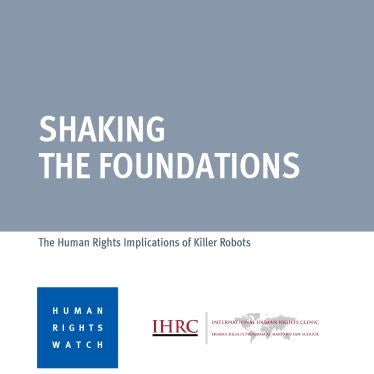The Pentagon is proposing to roll back U.S. policy on antipersonnel mines, Human Rights Watch said today.
According to government sources, Pentagon officials this month recommended that the U.S. abandon its standing commitment to join the 1997 Mine Ban Treaty by 2006 if alternatives to antipersonnel mines are identified and fielded.
"The existing U.S. policy to eliminate antipersonnel mines over time appears to be in jeopardy," said Mark Hiznay, senior researcher in Human Rights Watch's arms division.
The Pentagon's review is one component of a multi-agency landmine policy review. Officials in the Department of State and the National Security Council will now join the review prior to a decision by President Bush, which may occur by the end of 2001.
Such a policy shift would also do away with a decision made in 1998 to discontinue the use of antipersonnel mines not packaged with antivehicle mines in delivery canisters, except in Korea, by 2003.
"A reversal of the 2003 deadline frees up 86 percent of the current 11.2 million mine stockpile for use in the future," Hiznay said.
Inside the Army, a weekly newsletter on Army affairs, recently reported that the Army has zeroed-out funding in its 2003-2007 spending plan for one of the three tracks of the landmine alternatives program -- the NSD-A and RADAM programs. RADAM would be a new artillery-delivered system combining existing ADAM antipersonnel mines and existing RAAMS antivehicle mines. NSD-A (Non-Self-Destructing antipersonnel mine Alternative) aims at replacement for so-called dumb mines.
"The fact the Army wants to kill NSD-A, the most promising landmine alternative developed so far, before the landmine review is complete is another sign of the Pentagon's push to abandon current policy," Hiznay added.
The Pentagon is apparently also proposing to ditch a second track of its alternatives program -- the search for alternatives for so-called mixed systems that contain both antipersonnel and antivehicle mines. Though focused on tanks, these systems run afoul of the Mine Ban Treaty because they contain antipersonnel mines that an individual can set off.
Human Rights Watch believes that in any meaningful review the Bush Administration should reject the Pentagon's recommendation to abandon current policy and commitments. The presumption that antipersonnel mines are essential, as reportedly stated in the Pentagon review, should not be accepted without critical examination.
Human Rights Watch distributed a memorandum highlighting key issues and questions regarding the U.S. landmine policy review to the Bush Administration in June 2001.





